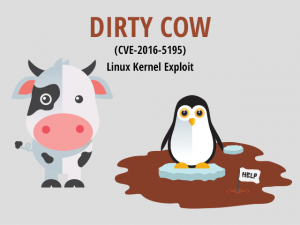Dirty COW Linux exploit
 Many Internet users still remember the nightmarish Poxy and Poodle vulnerabilities scare. But since they are a thing of the past the attention of users is recently drawn towards the new kid on the block – a Linux kernel flaw named “Dirty COW”.
Many Internet users still remember the nightmarish Poxy and Poodle vulnerabilities scare. But since they are a thing of the past the attention of users is recently drawn towards the new kid on the block – a Linux kernel flaw named “Dirty COW”.
Dirty COW is a privilege-escalation vulnerability. Hackers can use any type of Internet-connected device in order to exploit the vulnerability and harm web servers.
We tackled the issue swiftly and accordingly and patched our Linux-based system.
What is the Dirty COW security bug about?
The founder of Linux – Linus Torvalds first discovered it 11 years ago. This is the reason why you can hardly view the Dirty COW vulnerability as something new. However, until recently, the majority of Internet users were not familiar with it at all.
After the discovery of the vulnerability, the community released a bug fix patch in a short period of time. Three years later the bug fix patch was undone by another security fix. This left the Linux kernel vulnerable for nine years. But the ‘dirty’ Linux kernel threat was nowhere to be seen – until a couple of weeks ago.
According to Red Hat, the Dirty COW security flaw has enabled unprivileged users to gain root access and thus to increase their privileges and compromise the security of a particular server.
Local users can therefore gain write access to read-only memory mappings. This allows them to hijack an Internet-connected device in just seconds.
The name of the flaw derives from the broken copy-on-write (COW) mechanism in the Linux kernel.
Below is an informative video about the Dirty COW security flaw:
Is there a patch for the Dirty COW exploit?
The Linux community has marked the Linux kernel security flaw as “High priority” due to the fact that it has affected virtually all Linux OS versions.
After the rediscovery of the bug, the Linux community acted very quickly and released a patch.
Red Hat, Ubuntu, Debian, and all the rest of the major Linux distribution providers, have rolled out the necessary updates for their respective distributions accordingly.
Our team of administrators was also able to promptly patch the Linux kernel by following all the security instructions.
We have completely protected all of our web hosting servers against any eventual Dirty COW exploit attacks – including our cloud hosting servers, semi-dedicated servers, OpenVZ VPS servers, KVM VPS servers and dedicated servers. You don’t have to do anything on your end.

Leave a Reply